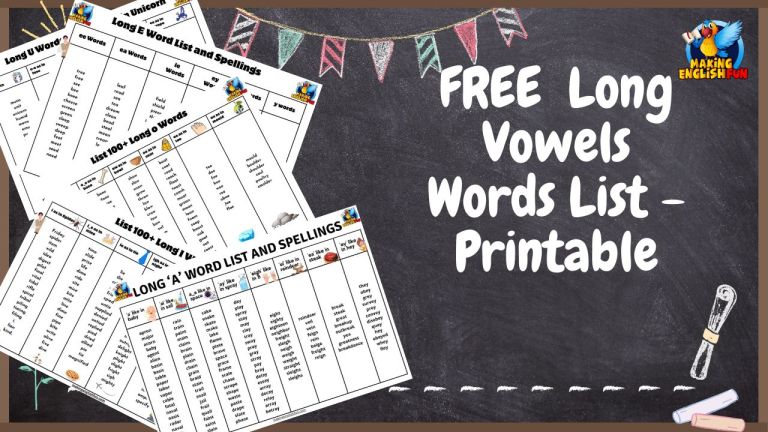What are Bonus Letters in English?
In this article we are taking a look at one of the spelling nuances in English ( there are a few!) – the concept of ‘bonus letters.’
In English, bonus letters are consonants such as ‘f,’ ‘l,’ ‘s,’ and ‘z’ that often double at the end of one-syllable words in closed syllables, following a vowel. This doubling keeps the short sound of the vowel. It’s a unique aspect of English spelling that aids in distinguishing similar-sounding words.
We’ll explore further what bonus letters are, the rules that govern their use, and their importance in English.

Plus, stay tuned for a special section on bonus letter worksheets that will help bring this concept to life!
What Are Bonus Letters?
Bonus letters in English spelling refer to the doubling of certain consonants at the end of words. That’s what we call bonus letters.
These are typically seen in one-syllable words that follow a vowel-consonant (VC) pattern. The most common consonants that are doubled as bonus letters are ‘f,’ ‘l,’ ‘s,’ and occasionally ‘z.’
The term ‘bonus letters’ arises from the idea that these consonants are added, or ‘doubled,’ at the end of words to preserve the short sound of the preceding vowel.
This rule helps in maintaining phonetic consistency and aids in differentiating between words where a vowel sound may change based on the ending consonant.
Without this doubling, our brains might make the vowel sound longer, as in ‘safe.’ This rule is a handy tool in our spelling toolkit, helping us distinguish between words and making pronunciation a breeze.

The Rule of Bonus Letters
Now, let’s get down to the nitty-gritty: how do bonus letters work? It’s simpler than you might think.
When a one-syllable word ends in a single vowel followed by ‘f,’ ‘l,’ ‘s,’ or ‘z,’ we often double that final consonant.
This doubling is like a linguistic guardian, ensuring that the vowel before it keeps its short sound. For example, in the word ‘staff,’ the ‘a’ stays short thanks to the double ‘f.’
It’s a spelling secret that helps us maintain phonetic consistency across the language.
Table of Examples with Bonus Letters:
| Bonus Letter ‘f’ | Bonus Letter ‘l’ | Bonus Letter ‘s’ | Bonus Letter ‘z’ |
|---|---|---|---|
| staff | bell | class | buzz |
| puff | hill | kiss | fizz |
| off | doll | pass | jazz |
| huff | tell | miss | whizz |
| cuff | well | loss | buzz |
Understanding Short Vowels and Consonants
The key to applying the bonus letters rule effectively lies in understanding short vowels.
In English, a short vowel is the sound a vowel makes that is not its name; for example, the ‘a’ in ‘cat,’ ‘e’ in ‘bed,’ or ‘i’ in ‘sit.’
When these short vowel sounds are followed by ‘f,’ ‘l,’ ‘s,’ or ‘z’ in one-syllable words, doubling the consonant at the end helps to maintain the vowel’s short sound.
This rule is an essential aspect of English phonetics and is particularly crucial for learners in the early stages of reading and writing.
Exceptions and Variations
While the bonus letters rule is a helpful guide, it’s important to note that English is a language rich in exceptions.
Not all words with a short vowel followed by ‘f,’ ‘l,’ ‘s,’ or ‘z’ will double the consonant. Take words like ‘chef’ or ‘gas’ – they don’t follow the rule.
Additionally, this rule primarily applies to one-syllable words, so it’s less likely to hold in longer words or those with different vowel-consonant patterns.
Understanding these exceptions is crucial for learners to avoid overgeneralization. It highlights the importance of being exposed to a wide range of words and contexts when learning English spelling.
Teaching the Bonus Letters Rule
Introducing the bonus letters rule in a teaching setting can be both engaging and effective.
Here are some strategies that educators can use:
- Visual Aids: Utilize charts or flashcards to illustrate the rule with examples. Color-coding vowels and consonants can help emphasize the pattern.
- Word Lists and Spelling Drills: Practice with lists of words that follow and break the rule. Regular spelling drills can reinforce the rule and its exceptions.
- Interactive Games: Incorporate games like ‘word sort’ or ‘spelling bee’ to make learning this rule enjoyable and interactive. These games encourage critical thinking about word patterns.
- Reading Practice: Use reading materials that include a good number of words following the bonus letters rule, helping students see the rule in context.
- Writing Exercises: Assign writing tasks where students use words with bonus letters, applying the rule in a practical setting.
Practical Applications and Exercises
To reinforce the understanding and application of the bonus letters rule, it’s beneficial to engage in practical exercises. Here are some suggested activities:
- Spelling Bee Contests: Organize contests focusing on words that follow and break the bonus letters rule. This encourages students to pay attention to spelling patterns.
- Writing Stories: Have students write short stories or sentences using a list of words that follow the bonus letter rule. This helps in contextualizing the rule.
- Fill-in-the-Blank Exercises: Create worksheets where students fill in the missing bonus letters in words, reinforcing their understanding of the rule.
- Word Search Puzzles: Include words that follow the bonus letter rule in word search puzzles, making the learning process fun and engaging.
- Peer Teaching: Encourage students to teach each other the rule, which can reinforce their understanding and confidence in using it.
These activities not only help solidify the understanding of the bonus letters rule but also make the learning process enjoyable and interactive.
Why Does English Have Bonus Letters
The existence of bonus letters in English is not just a random quirk but a linguistic adaptation. Historically, as English evolved from its Germanic roots, it underwent significant changes in pronunciation and spelling.
Bonus letters, particularly in words with short vowel sounds, serve a crucial phonetic purpose. They help in preserving the short sound of vowels in certain words, acting as a bridge between pronunciation and spelling.
This spelling rule aids in differentiating words that would otherwise sound similar
Conclusion
The bonus letters rule is a subtle yet vital part of mastering English spelling. Grasping this rule can significantly enhance a learner’s spelling and reading abilities.
While there are exceptions to the rule, getting familiar with the general pattern is essential.
- Continuous practice,
- exposure to various reading materials,
- and engaging learning activities
are the keys to mastering this aspect of English phonics. You can check out our bonus letters worksheets for more help and the resources below.







